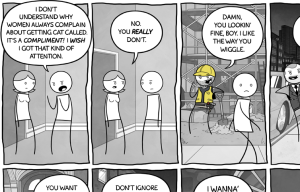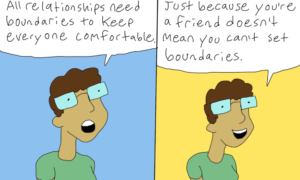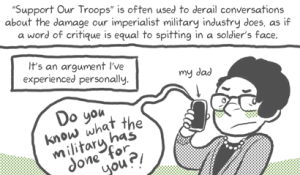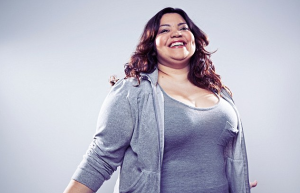
A person sitting in a wheelchair with a laptop on their lap, grinning slightly at the camera.
If you’re reading this in 2016, (I hope that future humans and mixed specied creatures will read my writing one day when the world is a kinder place than it is now), you might be familiar with the concept of attempting to get by under capitalism.
You might be a person who works, in a myriad of ways. And if you’re a disabled person who, like me, much paid labor is not made accessible to, you might sometimes have moments of figuring out how to have money, or to existentially define “work.”
But if you’re able bodied, you might not be familiar with just how often you can step in the way of disabled people like me trying to get by – so let me break it down for you.
Whether or not I’m getting paid, when I’m out in the world, interacting with nondisabled people, I’m always working.
I spend much of my time working to not tread on able bodied people’s feet in public – literally and figuratively.
Wheelchairs are space takers – it’s unavoidable. Someone in a chair sometimes takes up more lateral, but less longitudinal, space than an able bodied person does.
I’m working to increase my compassion, my critical lens, and calm my trigger responses every day.
But no matter how respectful, compassionate, or professional I behave in public, changing my approach won’t affect you if you’re not willing to work on yourself, to question your assumptions about disabled people.
It’s been an experience of mine, and other chair using friends, that able bodied people expect me to apologize to them for the physical space my wheelchair takes up, or the inconvenience my body poses, at the start of an interaction.
If I don’t, they might behave resentfully towards me for the space I unfairly, inequitably believe I am entitled to, independent from their intervention.
After all, able bodied people only divy up space in the fairest and most equitable of ways, right?
Sometimes – in professional settings, but in unprofessional ways – able bodied people invade my space non-consensually, and then expect me to welcome any of their advances with open arms.
They get upset when I say that I don’t want or need someone to touch me without asking, no matter their intent.
They’re very sensitive about our interactions, and for some reason, they assume that physically and apparently/visibly disabled people are not.
Because I’m incredibly visible to able bodied, sighted people, they assume that I am in and of myself a call to action. Demanding support, contact, inquiry, attention.
My body itself is a question, and my self-advocacy is a rude answer.
When we understand that dis/ability is a social identity, just like race, gender, sexuality, and more, we begin to understand that disabled people have complex lived experiences, traumas, sensitivities, personalities, likes/dislikes, and more.
We begin to see disabled people as people.
A working disabled person is a working person – and more importantly, a person. From one working person to another, I’d like to remind able bodied people that if you value professionalism, boundaries, and consent, then respecting disabled people’s boundaries when you work with us should matter to you – whether you’re at your job, their job, a job you share, or on the street.
But far too often, it seems that our boundaries don’t matter to able bodied people at all.
The following are interactions that many disabled people like myself must either deflect or avoid on a regular basis – whether we’re working, being worked for, or just trying to be alongside able bodied people in the world.
1. Ignoring My Consent Is Not Actually in Your Job Description
Starting at my body, telling me how unusual it is, touching me without asking, and stalking and reprimanding me – were these tasks part of your job training?
I was with my two best friends, flying from the Bay to Portland.
The airline, per my reservation, arranged for an aisle sized wheelchair to meet me to board and deplane.
Two agents operate this chair, and it’s their job to ensure any customer’s safe transfer and travel from seat to their own wheelchair.
One of the two agents who arrived began our interaction oddly – by staring at my legs and butt as I edged myself one footed towards where she was waiting.
“I’m sorry,” I asked as cheerfully as I could muster, “are you staring at my body?”
“Oh! It’s just very unusual, you see. Usually, the aisle chair is sitting in the aisle seat.” Note how she substituted “the aisle chair” for me, a human. Perhaps this was poetic? A metonym?
In the moment, I was not able to think so humorously – but I want to. I want to be that funny and generous on the fly badly.
But this time, I was already mad, protective, and using an instructive tone and a smile stretched across my face to hold it all together.
With the other agent silent and virtually ignoring the interaction, this girl told me not to be offended. She said that it was understandable for her to be curious about how I could do something so “unusual.”
At the same time, she began to touch my body to fasten every single strap on the chair.
I was not ready to be touched by her.
“I don’t need all of the straps please, not the leg ones.”
Baffled and upset, the agent told me that strapping me in was her job. This is partially true, but what this agent had already done, and what she would later do, went above and beyond her job description – and not in a good way.
She had also forgotten two important aspects of her job – consent and respect. And I told her so.
This agent proceeded to talk about me in front of me to the nearby flight attendants. When I told her that I could hear her, she ignored me and continued to talk.
My friends and I walked away ruffled and confused once I had gotten to my own chair.
I was so shaken from the interaction that I had to deep breathe for an hour on the drive from Portland to Eugene. I tweeted that I had only partially successfully thwarted objectification and a nonconsensual interaction while deplaning from an Alaska Airlines flight.
I didn’t tag any of my tweets, but Alaska Airlines responded right away. I tried to explain the situation without throwing the girl under the plane, so to speak – because I didn’t want to get her in trouble.
That night, someone issued a barrage of tweets responding to my tweet referencing the incident. This person, it became clear, was the airline agent who had been looking at my butt.
She told me that my self-advocacy was not that, but just an excuse for me to be rude to her and her “cohorts.”
And she said that when someone tells me a rule in regards to my bodily safety, I need to “comply and not make a fuss.”
I engaged her respectfully for a lot longer than I should have.
It wasn’t until the next morning that my best friend pointed out that my harasser had made that Twitter account – which had no other tweets, and no pictures – especially for the occasion of telling me that my feelings were bogus, and that she was in charge.
At the behest of Alaska Airlines, I blocked her.
2. Invading My Boundaries Doesn’t Ease the Pre-Show Jitters
Thanks, but getting yanked around by strangers is not really a treasured part of my pre-performance prep.
In San Francisco, a few friends host a party on Thursdays at El Rio.
I love to go to dance, drink, hang out with a few of my best friends in the Bay, and this past Pride, I was also performing as Prince.
While the bathrooms at El Rio are not wheelchair accessible by any technical definition, I’m familiar enough with one to know that it’s just a couple inches wider than my manual wheelchair, and if I take my footplates off, just deep enough to accommodate my entry and a K turn to close the door.
I had successfully peed somewhat neatly in a velvet bodysuit and was rolling out of the doorway when a person whom I read as a middle ageish queer woman abruptly leaned towards me.
This person grabbed both of my wheels and yanked me out of the bathroom towards her, yelling, “Let’s go, baby!”
I lifted my hands from my wheels and assumed the hands up, don’t shoot position, managing to leak out the words, “Whaaa!aaa!aa!tt!?”
This person let go and mumbled, “Sorry, I was just trying to help.”
Even without any appearance of distress or hesitation, I often have to put up with able bodied people’s invasive attempts to “help.”
The reader will be relieved to learn that despite this attack, the show went on, and the artist that night known as Prince was efficiently sexy as hell.
3. Your Surprise At My Employment Doesn’t Help Our Work Flow
You’re surprised that a disabled weirdo has a job – but why do I continue to feel like I’m the only person working here?
In fall of 2014, I had just begun working as an on-call peer counselor at a women’s shelter in San Francisco.
I was hoping that peer counselor meant exactly what it sounded like, and that my job would include talking to people in ways that fostered mutual growth.
Without the support of coworkers, it can be very demoralizing to do a job which already tests one’s emotional fortitude – like the ability to check one’s privilege or face one’s trauma, to assert boundaries, to decenter one’s own emotional reaction, and to maintain oneself as a simultaneously professional, functional, and compassionate presence.
But I eventually learned that when you’re a chair user working in a social work setting, not only will staff and clients alike assume that you don’t work there, but they might also find that you’re in the way when your skills lean more towards emotional and intellectual, rather than physical, labor.
To be fair, most of my clients treated me with much more respect, gratitude, and solidarity than most of my coworkers did.
One day, I was sitting just to the side and slightly in front of the main desk at the drop in center. The desk was too tall for me to see or be seen over, and had wires running underneath that my chair couldn’t navigate.
A peer counselor I hadn’t met before came in to relieve my coworker at the end of her shift. Her first reaction to seeing me was to gesture towards me and ask what I was doing there.
The coworker I had been with all day stood up and brightly began to introduce us, explaining that I was a new peer counselor who had started work a few weeks prior.
And the counselor who had just joined us began to crack up.
“Oh, that’s good!” she exclaimed. When neither I nor the other staff laughed, she then looked between us rapidly, cocked her head and asked, “For real?”
I left the room and looked for the office of my friend, who was a case manager there.
I thought if I could get in there and close the door, I’d be able to collect myself enough not to cry or say something I’d regret to the coworker I’d undoubtedly have to find a functional way to share space with.
But before I could close the door, she found me.
“You went into your defensive place before you could hear the rest of what I was saying! I said – that’s cool!”
It might very well be cool that I work there, but this interaction was not.
Later, she leaned onto the side of my chair and pointed at my legs. “So, are you ever going to walk? Do you go to physical therapy?”
“I don’t answer questions like that at work, or in an out-of-context conversation with someone I am just meeting,” I replied, doing my best to lean my torso in the opposite direction from hers to indicate that I was not excited to cuddle.
“Oh jeez, I’m sorry, I was just trying to get to know you and be friendly!”
Given our obvious commonalities (like being people of color, working at the same job, and living in the Bay Area), it’s ironic that she couldn’t find a topic of conversation other than a medical perspective on my body.
She had situated, then, that it was my body that was out of place at this juncture – not her attitude.
***
Are the ways that disabled people are belittled for asserting our agency not similar to the ways that women and femme people are called bossy when they demand respect? Or the ways that women of color might be called aggressive for standing (or sitting) up for themselves?
If you’re an able bodied person reading disabled people as ungrateful whenever we don’t respond in a cheerful and gracious tone, then you’re assuming that disabled people should feel grateful to be interacted with by nondisabled people at all.
A wheelchair isn’t an object or a symbol you can separate from a disabled and chair using person’s lived experience, nor can you use it to wholly represent that experience.
Disability is not an affliction or an accessory to be objectified. Disability is a part of an identity, and disabled people have feelings and purpose.
To understand what this means for our interactions, you have to listen to us without defensiveness when we assert our boundaries – even if you already think you have good intentions, even if you already think you know.
Interaction between disabled and nondisabled people can be a beautiful, mutual learning experience, not to mention part of mutual aid or access support.
Whether it’s your job or mine, a job which involves my body is one I have every right to have opinions and suggestions about.
From able bodied workers who interact with disabled clientele, such as the airline attendant in the first story, I’ve heard this response: “Do I come to your job and tell you how to do it?”
And interestingly enough, the answer is actually yes.
Able bodied people, as outlined in these stories, often do interrupt my work my process, or travel through a space in order to assert their ability and right to touch or question me, or even just to express their ignorance to the fact that I am working at all.
[do_widget id=’text-101′]
Neve Be is an Oakland- and Seattle-based disability justice activist, writer, performer, and educator. They are a staff writer at HARLOT Magazine and a columnist at maximumrocknroll. Other writing can be found on Model View Culture and Plentitude Magazine. They also co-facilitate a contact improvisation jam for all women and queer spectrum people, and organize with Sins Invalid. Neve is always down to mutually share stories, analyze pop/punk culture, and collaborate with artists throughout the Bay Area and the Pacific Northwest. You can find them on Tumblr, Twitter, and Instagram.
Search our 3000+ articles!
Read our articles about:
Our online racial justice training
Used by hundreds of universities, non-profits, and businesses.
Click to learn more
Most Read Articles
- « Previous
- 1
- …
- 30
- 31
- 32



















